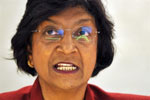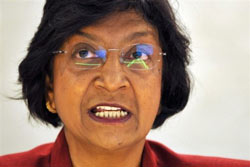 Reuters: Iran has witnessed a dramatic increase in executions so far in 2011, United Nations human rights chief Navi Pillay said on Wednesday and her office said the rate was three times that of last year.
Reuters: Iran has witnessed a dramatic increase in executions so far in 2011, United Nations human rights chief Navi Pillay said on Wednesday and her office said the rate was three times that of last year.
By Robert Evans
 GENEVA, Feb 2 (Reuters) – Iran has witnessed a dramatic increase in executions so far in 2011, United Nations human rights chief Navi Pillay said on Wednesday and her office said the rate was three times that of last year.
GENEVA, Feb 2 (Reuters) – Iran has witnessed a dramatic increase in executions so far in 2011, United Nations human rights chief Navi Pillay said on Wednesday and her office said the rate was three times that of last year.
Expressing alarm at the rise, she said at least 66 people, including three known to be political dissidents, were executed in January. Pillay aides said they had recorded about 300 executions for the whole of last year.
“We have urged Iran, time and time again, to halt executions,” said Pillay, the U.N. high commissioner for human rights, in a statement issued through the U.N. European headquarters in Geneva, where she is based.
“I am very dismayed that instead of heeding our calls, the Iranian authorities appear to have stepped up the use of the death penalty.”
Her spokesman, Rupert Colville, said tracking of official Iranian reports and the country’s media showed that last year the figure was running at about 18 to 25 a month. “So this year it is triple that rate,” he told Reuters.
Pillay, a former South African high court judge, said she was deeply concerned at the large number of people reported to be under sentence of death who included political prisoners, drug offenders and even juveniles.
“DISSENT NO CRIME”
“Dissent is not a crime,” she said. “It is absolutely unacceptable for individuals to be imprisoned for association with opposition groups, let alone be executed for their political views or affiliations.”
Such behaviour by a government was in violation of the United Nations’ international covenant on civil and political rights which Iran has signed.
“I call upon Iran to establish a moratorium on executions with a view to abolishing the death penalty,” she said.
“At a minimum, I call upon them (the Iranian authorities) to respect international standards guaranteeing due process and the protection of the rights of those facing the death penalty, to progressively restrict its use and reduce the number of offences for which it may be imposed.”
Also a former judge at the International Criminal Court, she is often accused by critics of the United Nations, especially in the United States, of not taking a strong enough position on abuses in countries such as Iran, Sudan and China.
Many Western diplomats, whose countries Pillay has sometimes criticised, say she has been as effective as she can be in a post which has no enforcement mechanism and where she has to work with an uncooperative U.N. Human Rights Council.
In the 47-country council, Iran and many other developing countries accused of abuse by rights activists are shielded from criticism by a majority alliance of Islamic and African countries usually backed by Russia, China and Cuba. (Editing by Andrew Dobbie)


